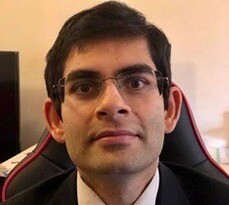
Dr Arjun Jain was pursuing his PhD in Reproductive Biochemistry at the University of Cambridge back in 2008. It was then that he started working on a molecule called endothelin(ET)-1. He soon realised that ET-1 is elevated in different diseases, including diabetes, different cancers, cardiovascular diseases and neurodegenerative disorders. Based on this, he began working on a potential therapeutic that would potently bind and sequester increased levels of ET-1. A decade later, a weekend at Cambridge Judge Business School kickstarted his idea into action.
Arjun is founder of the Cambridge-based startup venture ET-traps, which has created a soluble binder to the molecule Endothelin-1 that aims to lower levels of the molecule via the (patented) ET-traps technology. He has described the technique in a pre-clinical journal paper, and is now seeking further investment in order to proceed to clinical trials.
“While reading around the topic during my PhD thesis, I realised that elevated levels of ET-1 are implicated in a number of different diseases,” he said. “Blocking it seemed to be a therapeutic use to treat these diseases, but it is associated with various side effects.” So ET-traps seeks to lower levels of ET-1 without negatively affecting its important physiological functions, which include maintenance of the blood pressure, tissue differentiation and cell proliferation. A turning point for ET-traps came in March 2015 when Arjun attended the Biotech Startup Weekend organised by the Entrepreneurship Centre at Cambridge Judge, to pitch his business idea.
His team won first place that weekend, and the startup was officially launched a few months later. Arjun says the event helped catapult the idea forward and provided an opportunity to secure Angel investment; “winning first prize at the Biotech startup weekend our venture secured funding that allowed us to pursue development of the ET-traps and establish the proof of concept both at the in vitro and later at the in vivo levels”. In April 2015, ET-traps (formerly known as Endotraps) joined the Accelerate Cambridge programme at the Cambridge Judge Entrepreneurship Centre, which provides mentoring and other help to startup ventures.
ET-traps is focusing initially on treating diabetes, a metabolic disorder characterised by high blood sugar levels over a prolonged period. Arjun says currently available therapies are mainly limited to glucose control and medications to treat the disease complications, but do not prevent progression of a disease that can cause irreversible vital organ damage. According to the World Health Organization, the number of people with diabetes has risen from 108 million in 1980 to 422 million in 2014. In the UK alone it is estimated there are over four million people living with diabetes.
Pre-clinical trials of the ET-traps treatment on animals showed a “significant return to non-diabetic levels,” says a paper by Arjun and colleagues recently published in the journal Drug Discovery Today.
Yet diabetes isn’t the only disease that the therapy might help, because elevated levels of endothelin-1 are also found in many other ailments.
“ET-traps could provide a useful treatment option for a host of different diseases in which pathologically elevated ET-1 is a feature, including cardiovascular diseases, neurodegenerative disorders, and pregnancy disorders,” the paper says. “Given that various other diseases also have pathologically elevated levels of ET-1, it is likely that the ET-traps could also be used in these disease areas, although such use requires testing in relevant animal models.”
Born in New Delhi, India and having grown up in Singapore, Arjun was recently shortlisted for the Researcher of the Year at the Cambridge Independent Science and Technology Awards. He says the next step is getting the required funding for clinical trials, and he hopes to partner with a large pharmaceutical company as that would speed up the process of getting the product to the market.
Anthony Harris, who was Arjun’s mentor at the Accelerate Cambridge programme, said: “This technology has huge potential in treatments but, like all technologies born in university laboratories, it will need to tread the road of extensive clinical trials before it can be proven in the field. If ET-traps can prove the technology in-vivo (in the body) rather than just in-vitro (in the test tube) then their future is assured.”


